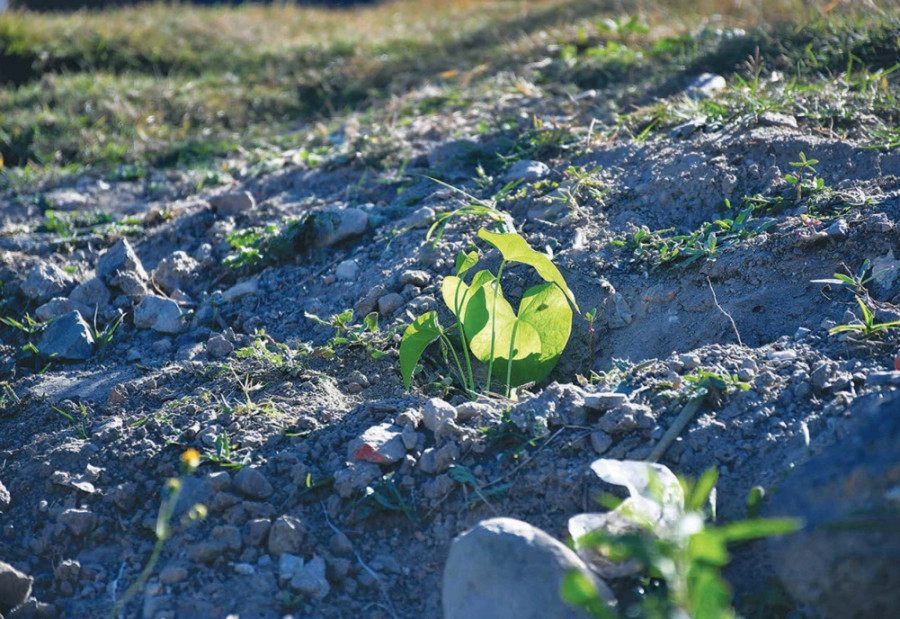Valley
Traffic police plant 1,500 saplings of an unproven herb to fight against Covid-19
National Planning Commission and the tax office provided vine saplings of gurjo, used in ayurvedic medicine. Traffic police are upbeat it will develop immunity among them.
Anup Ojha
In an effort to boost the immunity of traffic policemen, the Metropolitan Traffic Police on Saturday morning planted 1,500 saplings of gurjo (tinospora cordifolia) on the barren land at Tinkune park.
The plantation of gurjo saplings, said Senior Superintendent of Police Bhim Prasad Dhakal, would help the traffic police increase their immunity as they come in contact with a lot of people. So far, over 400 traffic police have already been infected with coronavirus.
“The plant increases the immunity power so we have planted Gurgo in the open space and all our offices in Kathmandu Valley to promote this plant,” said Dhakal.
The gurjo saplings were handed to the traffic office by the Inland Revenue Department and National Planning Commission.
Although the herb is used in traditional ayurvedic medicine, it has not been clinically proven to be effective against the coronavirus.
Virologists are reluctant to talk about or encourage having gurjo. “There is no clinical evidence of curing Covid-19 by having gurjo. I guess ayurveda and alternative medicine practitioners can better explain it,” said Dr Sher Bahadur Pun, a virologist at the Sukraraj Tropical and Infectious Disease Hospital, Teku.
But even the government’s ayurvedic experts do not vouch for the herb against Covid-19.
Dr Basudev Upadhyay, director general at the Department of Ayurveda and Alternative Medicine, agreed that none of those homemade or homegrown remedies have clinical proof and said that the herb does not come under the Ministry of Health and Population’s protocols and guidelines.
It was India’s celebrated yoga guru Baba Ramdev who advocated that yoga and ayurvedic medicines can prevent and cure the Covid-19.
“But gurjo has great medical significance and can help develop immunity. It should not be taken without doctors’ prescription,” said Upadhyay.
However, he also said that over consumption and taking it without a doctor's prescription have caused many side effects among people. “So people should be conscious of consuming it,” said Upadhyay.
It’s not only Dhakal, even Prime Minister KP Sharma Oli has been vocal about eating home remedies like garlic, ginger and turmeric and sneezing it can take away Covid-19 that earned ridicule in social media.
The traffic division office has also announced plans to plant four gurjo plants in its 44 different units all across the Valley.
As of Saturday, the country reported 17 Covid-19-related fatalities, taking the death toll to 937. The country also recorded 2,508 new cases, pushing the national infection tally to 170,743.
Since the start of the Covid-19 pandemic, gurjo, a vine plant, has become a household name. The vine plant in recent time has become wildly popular in the market. Once a highly neglected plant that was just limited in the wilderness, gurjo has been widely popularised as a medicine for coronavirus and the plantation, sale and consumption of gurjo has increased across the country.
The traffic police department’s efforts to grow gurjo has also been questioned for the wherewithal it has to take care of the saplings.
“This is just nonsense and a publicity stunt. Who will keep tabs of those plants?” said Binod Shrestha, 43, a local businessman in Tinkune. “Since the gurjo is a vine plant, it needs trees or some support. So how is it going to grow here? Also, as many people know its medicinal benefits, none of those plants will remain there intact.”
The Tinkune Park has been neglected for over a decade due to disputes over its ownership and compensation. It has been beautified occasionally to impress important visitors. Last year in October, during the Chinese President Xi Jinping’s visit in Kathmandu, the Kathmandu Metropolitan City had planted flowers, plants and pieces of grass carpet making the embankments, but as Xi departed Kathmandu, those beautification materials were stolen.
Earlier, the metropolitan city office had made numerous failed plans to maintain the park but it has long been a dumping place. And after last year’s beautificain, the Tinkune ‘park’ has become a safe haven for drug users, prostituion and hooligans, according to Tinkune police. But after six months of lockdown, the park is now filled with bushes.




 9.83°C Kathmandu
9.83°C Kathmandu.jpg)














